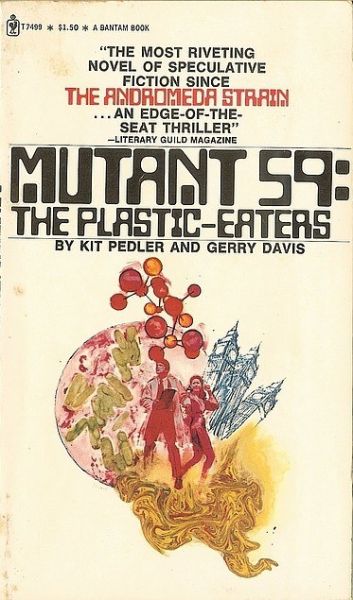Life in Plastic
Mutant 59: The Plastic Eaters
By Kit Pedler & Gerry Davis

3 Apr, 2022
Kit Pedler and Gerry Davis’ 1971 Mutant 59: The Plastic Eaters (in other editions, Mutant 59: The Plastic Eater) is an environmental disaster thriller. Although thematically and creatively related to Pedler and Davis’ television show Doomwatch, Mutant 59 is not part of that continuity.
Calamities strike in near-earth orbit (Apollo 19), in the sky (BEA Flight 510 from Paris to Heathrow), in the sea (the nuclear-armed sub HMS Triton) and on land (Lionel Slayter’s computerized learning road system). Why these transport vehicles or services have been destroyed is not clear. At first. There is a trait that they all shared. What that is won’t be clear until London is in ruins and civilization is imperiled.
Dr Simon Ainslie had a simple dream. The world is being threatened by growing heaps of plastic waste. He would solve the problem by mutating and selectively breeding bacteria until he had a strain that could digest plastic. His 59th attempt was successful. The solution to the plastic crisis was living in his test tube.
Ainslie was a careful scientist. He kept each mutant strain in secure isolation; samples no longer of use were destroyed with acid. Mutant 59 could not escape into the greater world lacking some wildly unlikely combination of events … events such as Ainslie having a fatal stroke just as he was holding the tube of Mutant 59 over a laboratory sink. Tube falls, breaks, Mutant 59 disperses into the sewers.
Luke Gerrard of Kramer Consultancy believes that the common element in all these disasters may be his company’s new plastic, aminostyrene. It was thoroughly tested before release. Has a problem revealed itself only after sufficient time has elapsed?
Good guess, but no. The culprit is Mutant 59. At first, there is no way to know that the mutant bacteria is at fault. No one save the deceased Ainslie knew that he was investigating. But Luke’s team eventually follows a clue into London’s tube system, where they find Mutant 59 eating plastic insulation.
Alas! Mutant 59 does not just eat plastic. It produces hydrogen and methane as by-products. It has turned the tube system into a series of bombs waiting only the right spark to go off. Gerrard and his team are in danger. As is London as a whole.
Mutant 59 has reached the surface and there is so much plastic to eat.
~oOo~
Pedler and Davis may be best known to Doctor Who fans as the creators of the recurring series villains, the Cybermen. I may be wrong: copies of Mutant 59: The Plastic Eaters were in all the bookstores in the early 1970s. Television-averse SF readers may have known them only by this novel, which was harder to avoid than Thomas F. Monteleone’s Seeds of Change.
When Pedler and Davis penned Mutant 59: The Plastic Eaters, they had been writing, and publishing, for some time. It is odd, therefore, that the book is such a dog’s breakfast. It begins with a series of mishaps, then introduces crowds of characters. Who are the protagonists? That’s unclear for a good portion of the novel. Clumsy infodumps abound. The obligatory romance is handled with all the delicacy of the Titanic slamming into the iceberg. There is a gratuitous plot (criminals) that does nothing other than pad the page count. The solution to the problem of Mutant 59 is unconvincing, given the scale of the problem1. The book is neither well written nor effectively edited.
Still, the notion of a bacterium that eats plastic is an interesting one. What would happen if it got loose? We may soon find out.
Mutant 59isn’t a good book, but thriller historians may find it of interest.
Mutant 59: The Plastic Eaters is available (as an ebook) here (Amazon US), here (Amazon Canada), and here (Amazon UK) but I did not find it at Barnes & Noble, Book Depository, or Chapters-Indigo. Physical copies may require a visit to your favourite used bookseller.
1: Or perhaps the problem isn’t solved. For all we know civilization collapses after the end of the book.
